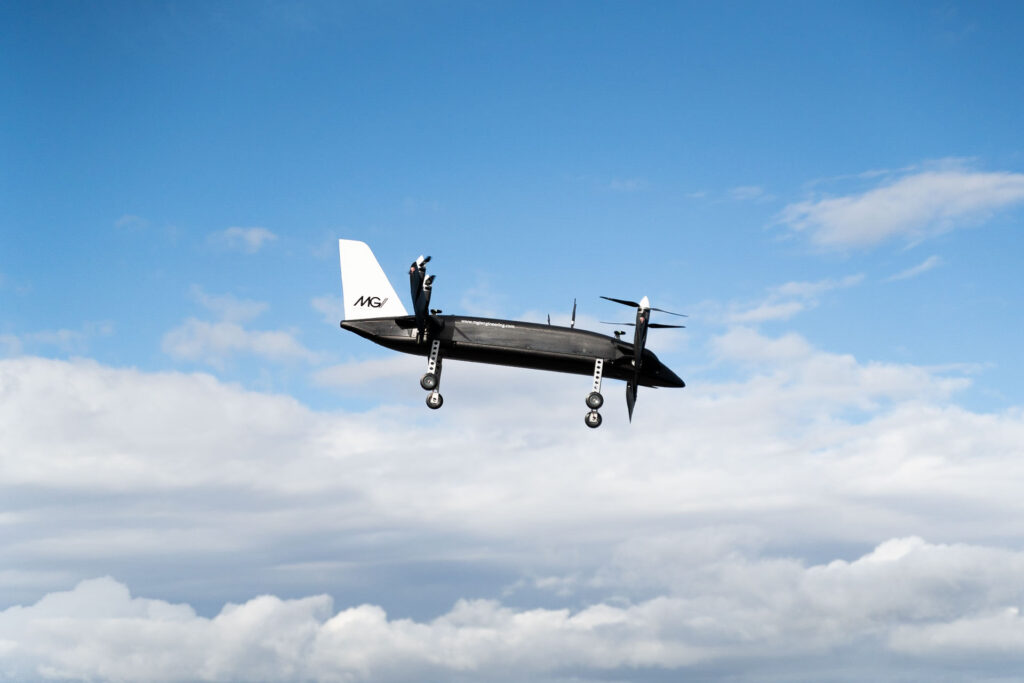With the global Electric Vertical Take Off and Landing (eVTOL) market predicted to grow with a Compound Annual Growth Rate (CAGR) of 23.13% and a market valuation of USD 23.21 billion by 2028, there is a growing market need for a noise-free, green-energy alternative to traditional aircraft that is capable of transporting both goods and people while being beneficial for the environment. With passenger eVTOL being several years away due the certification process, MGI Engineering will focus its efforts within unmanned cargo delivery applications to satisfy the demand in a more efficient manner.
So why is MGI choosing to focus on Unmanned Aerial Vehicles (UAVs) for its cargo delivery applications? We believe there is an opportunity for us as lightweight aerodynamic vehicle specialists. The industry is in its infancy so there is room for us to capitalise on the market before it becomes saturated. We enjoy the demands that the world of eVTOL presents us and relish the challenge of engineering new technology.
Unmanned aircraft can serve multiple applications including logistics, mail delivery, medivac, disaster relief, and more. Additionally, UAVs can complete the mission profiles in a way that is potentially cheaper, quieter, and more environmentally friendly than today’s current solutions, such as helicopters.
The attractiveness of the eVTOL industry for us at MGI is that we can use our specialist background, applying our expert Formula 1 and aerospace knowledge to this new sector. For us this is a niche, lightweight, composite, hybrid powered vehicle that just happens to be an aircraft. The requirements or mission profiles for eVTOL vehicles exist now, but the vehicles themselves do not and that’s what we at MGI Engineering aim to solve.
We’re right on the cutting edge of this novel technology being able to execute specific mission profiles, such as the delivery of medical supplies, emergency equipment, and other essentials. We believe that not only do these vehicles have uses in both urban and remote environments, but we also believe that passenger applications will come out of the safe application of thousands of hours of cargo flights.
Additionally, there is the reliability factor to consider. Conventional aircraft have highly complex propulsion units, such as the gearboxes in helicopters. With eVTOL aircraft using simple systems – multiple, dispersed, direct drive, electric motors – the reliability and therefore inherent safety of the vehicle can be optimised beyond that of helicopters. Further to this, as there are multiple propulsion units, redundancies are built into the vehicle architecture. If an unlikely failure is to occur, then the vehicle can survive on a reduced number of rotors to keep it airborne.
Cost is the most important area to enable this industry to succeed. The potential for unmanned eVTOL to operate at a reduced costs over conventional aircraft will make the current missions that are prohibited by cost, viable. Weather conditions will also be less impactful on services, for example, with a flight range of over 160 kilometres, it is expected that UAVs will be able to fulfil deliveries of necessary supplies to offshore islands despite poor, foggy weather conditions. As in the case of the Isles of Scilly, for 30% of the year deliveries are unable to take place due to fog.
Nonetheless, it is important to note that through the development and thousands of flight hours with unmanned eVTOL aircraft, there is a greater potential to build in certification that can be useful for further Advanced Air Mobility (AAM) use cases which includes manned flights. It is our understanding that by having a proven platform of reliable and safe flights with UAVs, that the eVTOL industry can then use this as a foundation to enter into manned eVTOL flight. UAVs for cargo and logistics are more achievable in the short-term than passenger applications.
We believe that our long history of working with niche, composite, lightweight structured vehicles within the fast-paced industry of Formula 1, puts us in an advantageous position to apply our knowledge to the industry of niche, composite, lightweight structured unmanned cargo eVTOL vehicles. We have successfully engineered a working cargo UAV technology demonstrator in answer to the challenges of the cargo eVTOL market space showcasing not only our abilities but also advanced structural lightweight design. Our engineering-led and focused experience means we are suitable and capable of creating a viable offering to the need for green-energy environmentally friendly solutions within the growing cargo eVTOL market.
